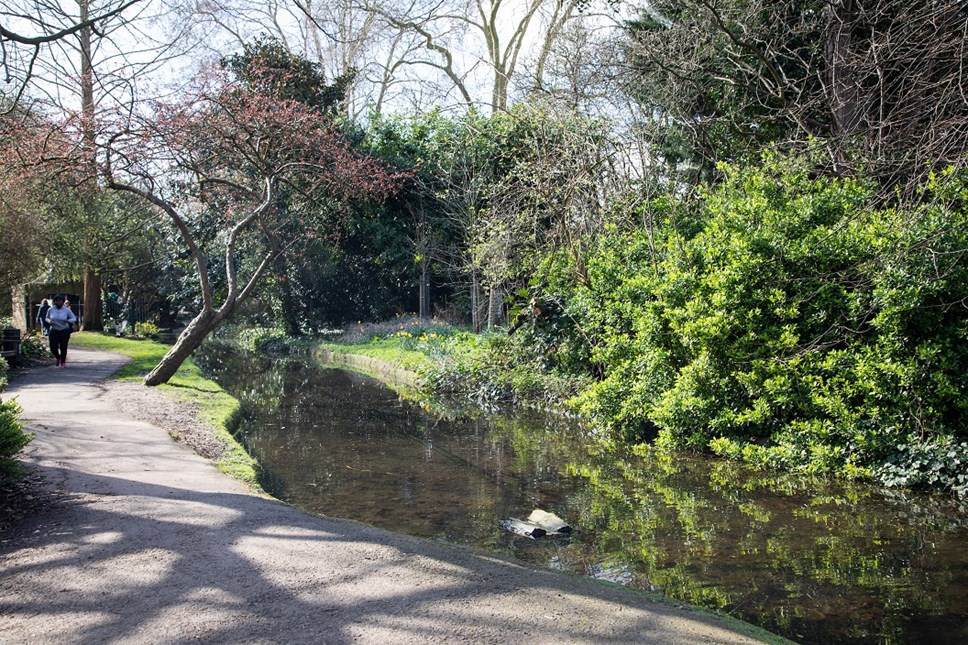
Major improvements to make New River Walk cleaner, greener, and healthier
New River Walk, one of Islington’s most historically-significant landmarks, will soon benefit from major improvement works to create an environmentally-friendly haven for wildlife and local people.
Built in the early 17th century by famous engineer Sir Hugh Myddelton to bring clean drinking water into London from Hertfordshire, the New River has been a home to wildlife and a popular walking spot for local people for more than 400 years.
In recent years, the council has been looking at ways to make the New River a more welcoming environment for local people and species. Currently, an issue with the water pumps at the river has led to a build-up of silt, decreasing the quality of the New River’s water. During the summer months, these issues also cause a build-up of green duckweed on the surface of the water, as well as unpleasant smells.
The council is determined to ensure that its public spaces are as welcoming and environmentally-friendly as possible, which is why it is planning major improvement works at New River Walk. The works will enhance the area for wildlife, increasing planting and creating a more welcoming habitat for species like dragonflies, frogs, newts and moorhens.
To make this possible, the council plans to install a new pump system in the New River, and will repair any leaks. In addition, the council will remove large amounts of silt from the New River, and will use it to help create new plantings on the edge of the water to act as wildlife habitats.
The works - which will begin this month - will see the New River dredged and restored, to improve water quality and make the installation of the new pump system possible.
Cllr Rowena Champion, Islington Council’s Executive Member for Environment, Air Quality, and Transport, said: “We’re determined to maximise the potential of Islington’s public spaces, and there are few in the borough that are more historic and well-loved than the New River Walk.
“Our major programme of improvement works will help create a more environmentally-friendly, welcoming area, where a broad range of species can thrive, including dragonflies, frogs, newts and moorhens.
“We’re looking forward to seeing the positive benefits that the improvements bring in boosting biodiversity, and in making the New River Walk a more pleasant area that everyone can enjoy.”
As part of the improvement works, fish and terrapins that had been put into the New River by people no-longer wanting them as pets will need to be removed. Unfortunately, as they are not native species to UK rivers, it is illegal for them to then be re-introduced into the river. The council is working with a contractor, who will safely and humanely transport the terrapins to Suffolk, where they’ll be rehomed in suitable ponds and lakes. As the fish and terrapins have a detrimental impact on other wildlife in the New River, their safe rehoming will support biodiversity in the area.
In parts of the New River Walk, trees and shrubs have grown over the waterway. This contributes to the build-up of silt, which in turn prevents biodiversity. To enhance the biodiversity of the New River, the council plans to cut back shrubbery and, where necessary, remove a number of overhanging trees, some of which are low-quality, dead, diseased, dying, or of little to no long-term benefit. Reducing the shade from the trees and opening up the waterway to more light will be beneficial for wildlife and the long-term maintenance of the New River.
While the improvement works take place, the council will strive to keep the New River Walk open as much as possible. However, there will be periods of time where it’ll be necessary to temporarily close off part of the site – the council will keep local people updated, and will work to minimise disruption.
Further information on the works can be found on the council's website.
Contact information
If you are a member of the public with a general question about the council please view the contact information on our website or call 020 7527 2000.
